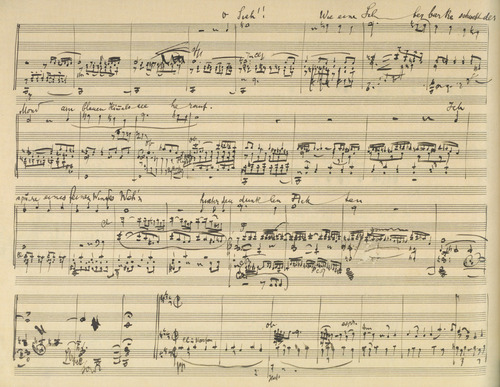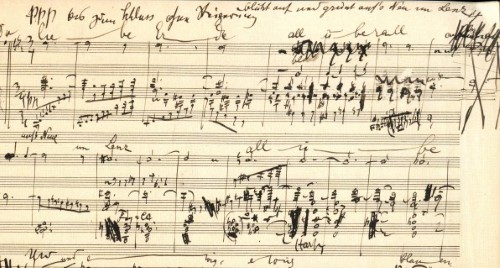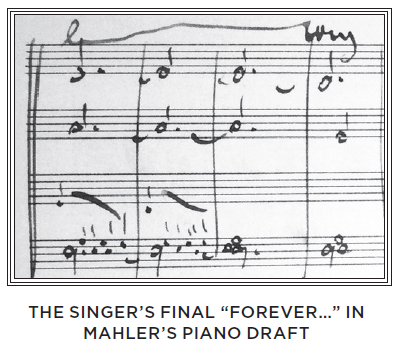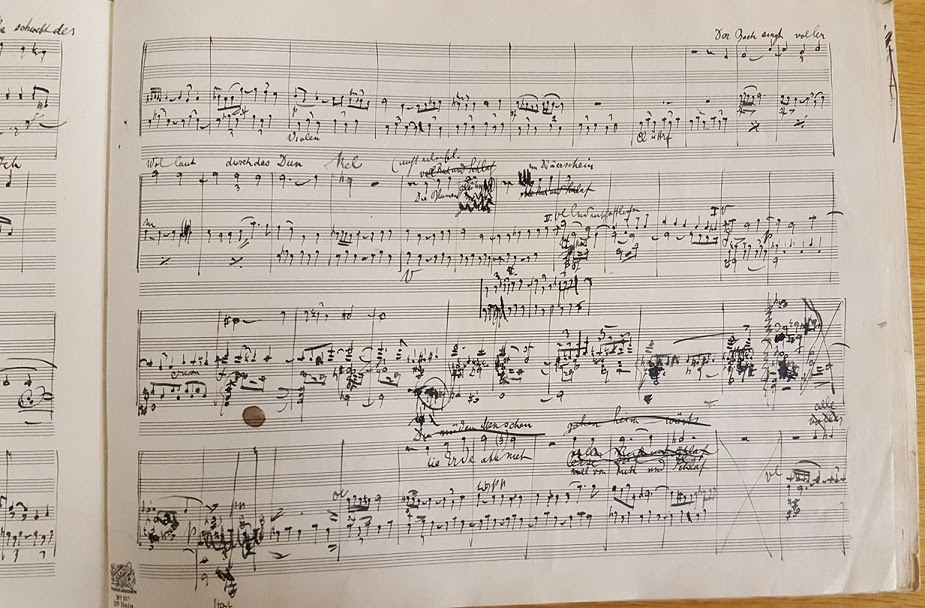The farewell
- Der Abschied.
- Key: C minor to C Major.
- Schwer. (Heavy).
- After Chinese poets: Mong Kao Yen and Wang Sei.
- Voice: Alto (or Baritone).
- Solo: Mandolin, harp, celesta.
- Duration: 31 minutes.
The final movement is nearly as long as the previous five movements combined. Its text is drawn from two different poems, both involving the theme of leave-taking. Mahler himself added the last lines. This final song is also notable for its text-painting, using a mandolin to represent the singer’s lute, imitating bird calls with woodwinds, and repeatedly switching between the major and minor modes to articulate sharp contrasts in the text.
The movement is divided into three major sections.
- In the first, the singer describes the nature around her as night falls.
- In the second, she is waiting for her friend to say a final farewell.
- A long orchestral interlude precedes the third section, which depicts the exchange between the two friends and fades off into silence.
Lines 1-3, 17-19, and 26-28 are all sung to the same music, with nothing but a pedal point in the low strings and a countermelody in the flute. The singer repeats the final word of the song, ‘ewig’ (forever), like a mantra, accompanied by sustained chords in the orchestra, which features mandolin, harps, and celesta.
‘Ewig’ is repeated as the music fades into silence, the final chord ‘imprinted on the atmosphere’ as Benjamin Britten (1913-1976) asserted.
Nirvana
Throughout Das Lied von der Erde there is a persistent message that ‘The earth will stay beautiful forever, but man cannot live for even a hundred years’. At the end of ‘Der Abschied’, however, Gustav Mahler adds three original lines which repeat this, but purposefully omit the part saying that ‘man must die’. Conductor, composer, and musicologist Leonard Bernstein (1918-1990) asserts that this ties in with the Eastern idea of Nirvana, in that the ‘soul’ of the singer, as s/he dies, becomes one with the everlasting earth.
Conducting
The last movement is very difficult to conduct because of its cadenza-like writing for voice and solo instruments, which often flows over the barlines. Mahler specifically instructed the movement to be played ‘Ohne Rücksicht auf das Tempo’ (Without regard for the tempo). Bruno Walter (1876-1962) related that Mahler showed him the score of this movement and asked about one passage, “Can you think of a way of conducting that? Because I can’t. ‘Mahler also hesitated to put the piece before the public because of its relentless negativity, unusual even for him’. ‘Won’t people go home and shoot themselves?’ he asked.
Das Lied von der Erde, Lied 6: Der Abschied. Keyboard.

Das Lied von der Erde, Lied 6: Der Abschied. Keyboard.
Das Lied von der Erde, Lied 6: Der Abschied. 1917: Vienna with the Vienna Philharmonic Orchestra (VPO). Das Lied von der Erde. (Durigo and Urlus). 30-12-1917. Alma Mahler gave Willem Mengelberg (1871-1951) a manuscript-partiture and a manuscript-particel from Lied 6: Der Abschied (last movement of Das Lied von der Erde). The manuscripts were packed in a beautiful cassette given by Alma Mahler (1879-1964) in gratitude to the conductor. On the inside of the cover she wrote a flattering mission: “Dem Freunde Gustav Mahler / dem herrlichsten Interpreten seiner Werke / Willem Mengelberg / Der Abschied (Lied von der Erde)/ Partitur und Clavierauszug / am 30 dec. 1917 von Alma Mahler gegeben” which indicates how closely Mengelberg came to Mahlers musical intentions. From all of Mahler’s work, Mengelberg had with Das Lied von der Erde the most intense band and he reached a definite highlight with his interpretations. (Keyboard and Orchestral).
Das Lied von der Erde, Lied 6: Der Abschied. Keyboard.
Das Lied von der Erde, Lied 6: Der Abschied. Keyboard.

Das Lied von der Erde, Lied 6: Der Abschied. Keyboard.

Das Lied von der Erde, Lied 6: Der Abschied. Keyboard.
Das Lied von der Erde, Lied 6: Der Abschied. Orchestral.
Das Lied von der Erde, Lied 6: Der Abschied. Orchestral.
Der Abschied
Die Sonne scheidet hinter dem Gebirge.
In alle Täler steigt der Abend nieder
Mit seinen Schatten, die voll Kühlung sind.
O sieh! Wie eine Silberbarke schwebt
Der Mond am blauen Himmelssee herauf.
Ich spüre eines feinen Windes Wehn
Hinter den dunklen Fichten!
Der Bach singt voller Wohllaut durch das Dunkel.
Die Blumen blassen im Dämmerschein.
Die Erde atmet voll von Ruh und Schlaf,
Alle Sehnsucht will nun träumen.
Die müden Menschen gehn heimwärts,
Um im Schlaf vergeßnes Glück
Und Jugend neu zu lernen!
Die Vögel hocken still in ihren Zweigen.
Die Welt schläft ein!
Es wehet kühl im Schatten meiner Fichten.
Ich stehe hier und harre meines Freundes;
Ich harre sein zum letzten Lebewohl.
Ich sehne mich, o Freund, an deiner Seite
Die Schönheit dieses Abends zu genießen.
Wo bleibst du? Du läßt mich lang allein!
Ich wandle auf und nieder mit meiner Laute
Auf Wegen, die vom weichen Grase schwellen.
O Schönheit! O ewigen Liebens – Lebenstrunkne Welt!
(after Wang-Sei)
Er stieg vom Pferd und reichte ihm den Trunk
Des Abschieds dar. Er fragte ihn, wohin
Er führe und auch warum es müßte sein.
Er sprach, seine Stimme war umflort:
Du, mein Freund,
Mir war auf dieser Welt das Glück nicht hold!
Wohin ich geh? Ich geh, ich wandre in die Berge.
Ich suche Ruhe für mein einsam Herz.
Ich wandle nach der Heimat, meiner Stätte.
Ich werde niemals in die Ferne schweifen.
Still ist mein Herz und harret seiner Stunde!
Die liebe Erde allüberall
Blüht auf im Lenz und grünt
Aufs neu! Allüberall und ewig
Blauen licht die Fernen!
Ewig… ewig…
The farewell
The sun sinks behind the mountains.
Evening descends into all the valleys
With its shades that cool the air.
O look! Like a silver boat,
The moon floats up into the blue lake of the sky.
I feel a gentle breeze wafting
Behind the dark spruce!
The brook sings melodiously throught he darkness.
The flowers grow pale in the twilight glow.
The earth breathes, heavy with peace and slumber.
All yearning turns to dreams.
Tired folk go homewards
To remember forgotten happiness
And youth in sleep.
The birds quietly perch on their twigs.
The world is falling asleep.
A cool breeze blows in the shadows of my spruce.
I stand here and wait for my friend.
I wait for him to bid him a last farewell.
I long, O my friend, to enjoy
The beauty of this evening by your side!
Where are you? You have left me alone so long…
I stroll up and down with me lute
On paths swollen with soft grass.
O beauty! O world, drunk with eternal love and life!
(after Wang-Sei)
He dismounted from his horse and offered him the cup
Of farewell. He asked him where
He was going and also why it had to be,
He spoke and his voice was muffled with tears:
My friend,
Fortune was not kind to me in this world.
Where I am going? … I go to wander in the mountains
I seek peace for my lonely heart.
I am going home, to my resting place.
I will never roam again in foreign lands.
My heart is quiet and awaits its hour!
The dear earth everywhere
Blooms in spring and grows green
Again. Everywhere and forever
The far horizons are radiant with blue.
For ever… … for ever!
Listening Guide



